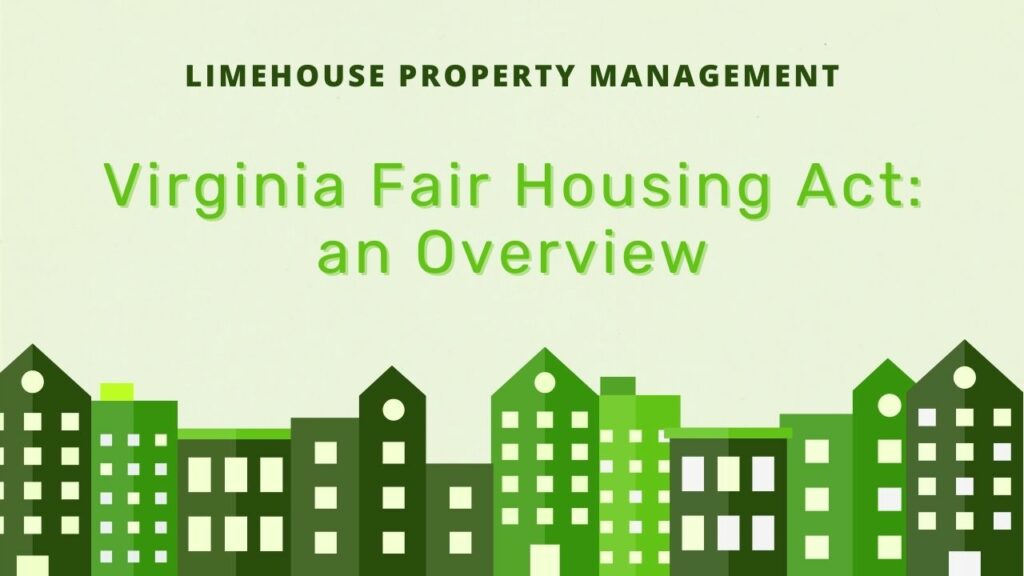Virginia Fair Housing Act: an Overview

The Fair Housing Act was passed by Congress in 1968. The act prohibits players in the housing industry from discriminating against renters and buyers on the basis of certain protected classes. It’s a part of the landlord-tenant law across the country.
The players in the residential housing industry include home sellers, housing providers, the real estate board, real estate agents, mortgage lenders, and of course, any Virginia residential landlord.
The Fair Housing Law was signed by President Lyndon Johnson. In doing so, the fair housing board grants fair housing protections and rights to renters and buyers under federal law. This fair housing policy aims to eliminate discriminatory housing practices.
A Brief History of the Housing Act (FHA)
The following are some of the historic events that led to the enactment of the bill into law. This is why fair housing laws apply today.
- Civil Rights Act of 1964. This is one of the crowning legislative achievements of the civil rights movement. It ended segregation in public places and banned employment discrimination on the basis of sex, nationality, religion, color, and race. The only downside of the act is that it didn’t address discriminator acts in housing matters.
- Civil Rights Group. There was a clamor for fair housing caused by a civil rights group, especially after the Vietnam War. BIPOC veterans sought to be protected from racial prejudice when they returned home after the war.
- Chicago Freedom Movement. Also known as the Chicago open housing movement, the Chicago Freedom Movement was led by Martin Luther King, Jr. The movement primarily focused on homeownership and rental injustices facing black families.

- Fair Housing Act. The act was signed into law on April 11, 1968. The act included clear stipulations regarding what housing practices constituted discrimination.
Fair Housing Protections in Virginia
The Virginia Fair Housing Law and fair housing requirements protect residents and home buyers in the following classes.
- Race
- Color
- Religion
- National origin
- Sex
- Familial status
- Disability
- Gender identity
- Veteran status
- Income source
Housing Discrimination
Discrimination refers to patterns of prejudice that affect a person’s ability to rent or buy a home. It’s illegal in almost all housing types, including public housing, private housing, and housing that receives federal funding.
From sheer hate to courteous but ignorant, discrimination can take different forms. Additionally, housing discrimination doesn’t always pit one person against another. It can also exist in ideas, practices, laws, beliefs, policies, and institutions.
Regardless of the type of discrimination that occurs, though, the outcome is all the same. There are also laws preventing discrimination against squatters, so it’s important to be familiar with those regulations as well.
Examples of Fair Housing Violations
The following are ways in which a landlord can violate the Virginia fair housing law.

- Using different qualifying criteria depending on a tenant’s protected characteristic.
- Harassing a tenant who is a member of a protected class under the Housing Act, such as a particular race.
- Charging a minority renter a larger security deposit.
- Failing to provide reasonable modifications for residents living with a disability. The modifications may involve doing things like providing ramps, installing grab bars, and lowering the entry threshold of a unit.
- Failing to make accommodations or provide assistance to disabled tenants on the existing house premises. For example, assigning a parking space closest to the tenant’s unit, or allowing an assistance animal even though you have a “no pets” policy.
- Refusing to provide housing opportunities to a tenant for no other reason other than because of their protected class like national origin or sexual orientation.
- Refusing access to rent or sell to a family with children citing noise potential complaints from other tenants.
- Retaliating against a tenant for filing a Fair Housing complaint, including breaking the lease early.
- Steering a renter away to particular areas based on one of the protected classes in Virginia.
- Responding to repair or maintenance requests differently depending on a protected class.
- Evicting a hoarder. The Housing Act categorizes hoarding as a type of disability.
Exemptions to the Fair Housing Laws
There are a handful of exemptions to the Housing Act. They are as follows.
- Single-family homes. However, the exception only applies to units that are rented by the owner or owners, and that the owner doesn’t own more than 3 units at a time.
- A building with a maximum of 4 units, if the property owner occupies one of the four units.
- Housing that is operated by private or religious organizations that cap occupancy to the members.
Avoiding Housing Discrimination
Landlords can avoid this by doing the following.

- Have a consistent screening process for all new tenants. While you have a right to choose the tenant you want, the selection process must be devoid of discrimination. When qualifying a tenant, you must use a standard screening process. The guidelines should be clear, visible, and impartial. A fair tenant screening process is one of the requirements under the tenant act.
- Understand the protected classes under the Virginia Fair Housing Laws. You have a smorgasbord of laws you must acquaint yourself with prior to renting out your home. Among these is the Housing Act. It protects the following classes of people: race, color, nationality, gender, religion, disability, familial status, sexual orientation, age, gender identity, sexual orientation, veteran status, and income source.
- Create uniform policies to handle maintenance requests. You may also want to provide basic FHA training to your maintenance team.
- Make reasonable accommodations and modifications to residents living with either a mental or physical disability
- Draft proper rental adverts. Rather than trying to describe the kind of tenant you want, focus on describing the property features instead. This can help you avoid using words that may inadvertently discriminate against a tenant. Such phrases include: Male/Female Preferred, No Children Allowed, or A Christian Neighborhood.
- Be careful of what you say. It can be impossible to know whether you’re talking to a prospect or a fair housing tester. Be careful, for instance, not to tell an applicant that a vacancy is filled when it actually isn’t.
Bottom Line
As a Virginia landlord, it’s important to familiarize yourself with all tenant laws. If, however, you need help in this regard, Limehouse Property Management can help. We provide full-service property management services for your Chesapeake, Virginia rental home.
Disclaimer: This blog isn’t a substitute for professional legal advice. Laws change and this information may not be updated at the time you read it. For expert legal advice regarding squatting laws in Virginia, get in touch with Limehouse Property Management.
